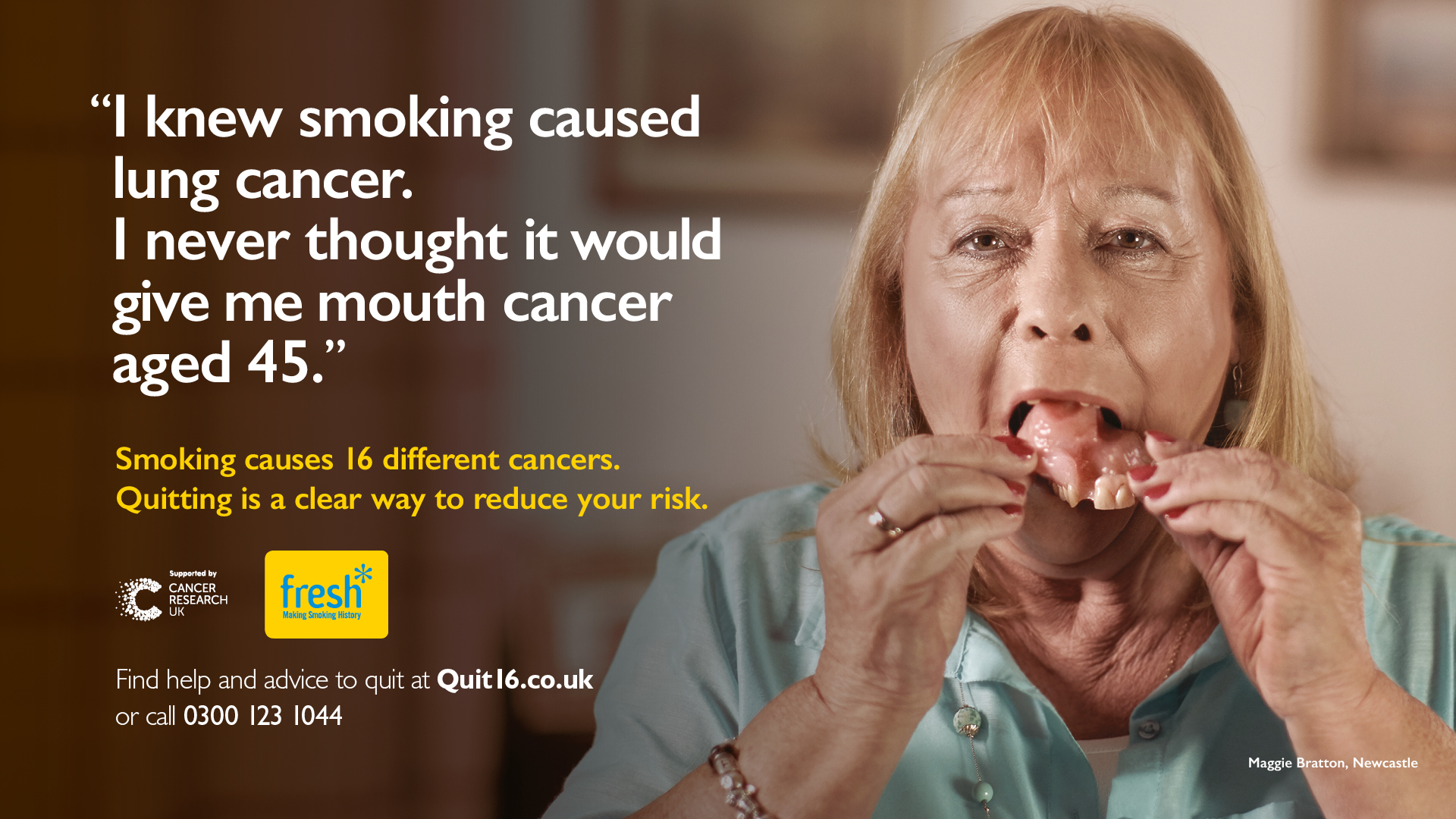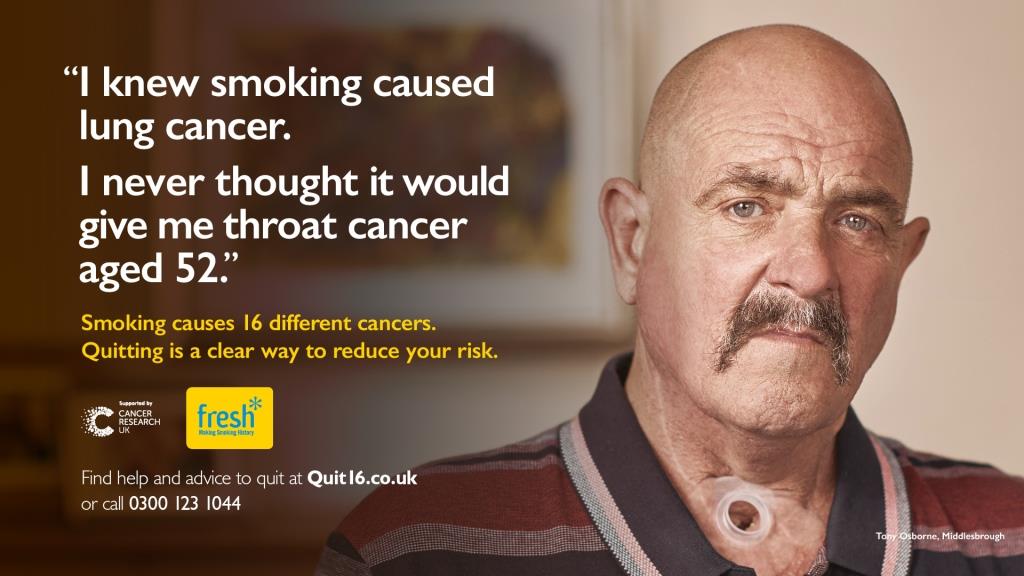Warnings from former smokers – Fresh launches new Quit 16 campaign


For some people in their 30s and 40s, the thought of cancer or COPD from smoking is often dismissed as a risk that feels years away…
But now two former smokers and cancer survivors are making personal appeals in a graphic quit smoking campaign that urges smokers to quit and reduce their risk – and never assume it won’t happen to them.
Maggie Bratton was diagnosed with mouth cancer at the age of just 45, resulting in an operation to remove the roof of her mouth. After undergoing an operation to remove the roof of her mouth, Maggie has to wear an obturator – a piece of plastic which enables her to eat and speak.
And Tony Osborne was diagnosed with laryngeal cancer when he was 52. Surgeons removed much of the inside of Tony’s neck, including his voice box, leaving him with a stoma (hole) in his throat through which he had to learn to breathe and talk again.
The campaign, from Fresh, is supported by Cancer Research UK. With smoking causing 14.7% of new cancer cases and 27% of all cancer deaths in England, it is estimated that smoking causes 44,100 new cases of cancer and over 36,600 deaths from cancer a year.
For the North East, that means smoking is estimated to cause over 2400 new cases of cancer a year and over 2140 deaths from cancer every year. Overall in England, there were 77,900 deaths attributable to smoking in 2016 from cancer and a range of other diseases including COPD, heart disease and stroke.
Maggie and Tony’s films, as well at quitting tips and details of local quitting support, are on the campaign website at http://www.quit16.co.uk/
Ailsa Rutter OBE, Director of Fresh, said: “Tony and Maggie are two incredibly brave people who want their experiences of smoking to be heard. They don’t want other people to have to go through the pain and the life-limiting surgery that they went through at a relatively young age.
“Tony and Maggie’s stories do not make comfortable viewing, but campaigns are a powerful way to encourage people to stop and young people not to start in the first place. In all our research with smokers, we know that hard hitting campaigns like this are extremely impactful to trigger quit attempts.”
“Although most smokers have heard of lung cancer, smoking causes 16 types of cancer, as well as heart disease, COPD, stroke, dementia and diabetes. Every clinician, GP and nurse is in a unique position to help stop more people like Maggie and Tony being diagnosed in the future.”
Tony Osbourne’s surgeon and consultant is Mr Shane Lester, ENT Head and Neck Surgeon, South Tees Hospitals NHS Foundation Trust, based at The James Cook University Hospital in Middlesbrough. He said: “A smoker’s risk of having laryngeal cancer is much higher than if you had never smoked at all. If you haven’t got cancer then stopping smoking can help prevent you getting cancer. For cancer patients, the chances of successful treatment are much better with stopping smoking.
“With head and neck cancer this can be very visible and surgery can change how your face moves, how you might eat or how you might speak. Even patients who get through everything and are out of surveillance still have to live with those side effects of it
.
“Sometimes people blame themselves, but lots of people who smoke started when they were kids, when the risks of smoking weren’t known and they got addicted. It’s far more healthy to look forward, to get help to stop smoking, and look forward to the health benefits of that.” Watch an interview with Mr Shane Lester.
Professor Eugene Milne, Director of Public Health, Newcastle City Council said: “Local authorities in the North East are committed to taking action to reduce smoking rates further and to build upon the solid progress over the last decade. Campaigns like this have been pivotal in helping smokers to stop and to stay stopped.
“Our local Stop Smoking Services can provide smokers with free, free and effective support to stop smoking and are also very happy to support smokers to quit who may wish to use an electronic cigarette.”
Dr Tony Branson, Clinical Lead for the Northern Cancer Alliance, said: “Every cigarette pumps harmful chemicals into the lungs, and around the body. Many of these are known to damage DNA, stick to cells, harm cell repair and cause cancer.
“Although treatment for many cancers has improved enormously, many patients find it hard to speak clearly, swallow, eat or function normally again.
“Quitting smoking is the best thing you can do for your health and it is crucial to stop for good as soon as possible.”
Dr Chris Tasker, a cancer GP for the Northern Cancer Alliance, said; “Smoking is by far the biggest preventable cause of cancer and while many patients know about the risks of lung cancer, tobacco increases the risk of cancers all over the body, including the mouth, throat, bladder, stomach, ovaries and bowel.
“While there are many other causes of cancer, if you smoke, you greatly increase your chances of cancer developing and this can be at a relatively young age in the 40s and 50s. Quitting is the single biggest step you can take to reduce your risk.
“There is lots of support for smokers to quit – I’d urge any smoker to talk to their pharmacist, GP or stop smoking service to quit now and reduce these risks.”
North East smoking rates have fallen by 44% since 2005 when 29% of North East adults smoked down to 16.2% of people in 2017 – around a quarter of a million fewer people smoking. Recent national projections suggest national smoking rates could fall by another 1/3 by the year 2023 – which would mean only around one in ten adults smoking.
Besides lung cancer, smoking also causes cancers of the mouth, nasal cavities, pharynx and larynx, stomach, kidney, bowel, liver, pancreas, cervix, bladder and ovaries, oesophagus and ureter, as well as myeloid leukaemia. There is also some evidence that smoking could cause breast cancer.
